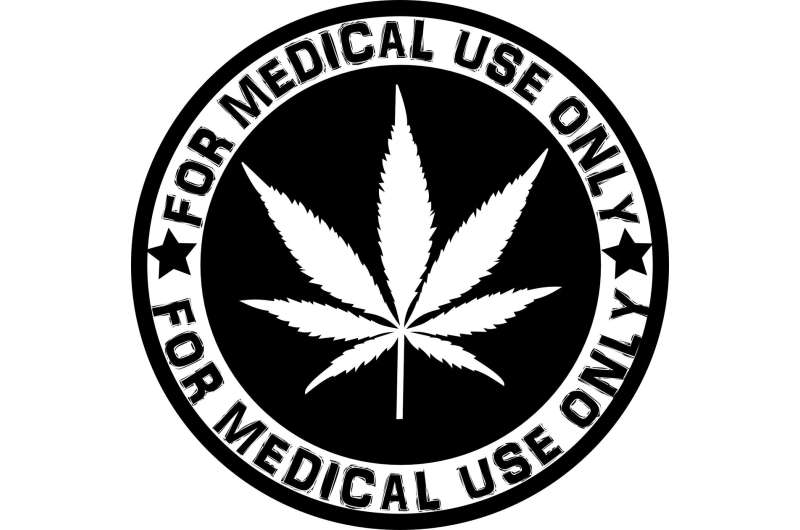This article has been reviewed according to Science X's editorial process and policies. Editors have highlighted the following attributes while ensuring the content's credibility:
fact-checked
peer-reviewed publication
trusted source
proofread
Medical cannabis patients who feel 'high' report greater symptom relief but increased negative side effects

In a new study titled, "Understanding feeling 'high' and its role in medical cannabis patient outcomes," published in the journal, Frontiers in Pharmacology, researchers at The University of New Mexico, in collaboration with Releaf App, found that patients who reported feeling "high" experienced 7.7% greater symptom relief and an increase in reporting of positive side effects such as "relaxed" and "peaceful." However, these benefits must be weighed against a more than 20% increase in negative side effect reporting.
Senior author and Associate Professor of Psychology, Jacob Vigil, explained the motivation for the paper. "Feeling 'high' is poorly defined in the scientific literature, but is generally associated with both impairment and feelings of euphoria," said Vigil. "Typically, feeling 'high' is assumed to be the goal of recreational use, but a limitation to cannabis' therapeutic potential. In this paper, we test the validity of this assumption and find that feeling 'high' may be an unavoidable component of using cannabis medicinally."
In the study sample of almost 2,000 patients, who recorded more than 16,000 medical cannabis administration sessions using cannabis flower, the study found that 49% of participants reported feeling high. Feeling high was highly correlated with a variety of side effects. The most highly correlated positive side effects were "chill" and "happy," while the most highly correlated negative side effects were "dry mouth" and "red eyes." Conventional definitions of feeling high typically involve impairment and euphoria, which was supported by the study results—feeling high was statistically significantly associated with feeling clumsy, confused, dizzy, foggy, and paranoid, and well as effects like happy, grateful, great, and optimistic.
With respect to symptom relief, the study found strong positive correlations between feeling high and greater symptom relief, even after controlling for THC and CBD levels, dose, mode of consumption (pipe, joint, vaporizer) and starting symptom severity. This suggests that feeling high may be a fundamental component of the effective use of cannabis as medicine, rather than a tangential, negative effect to be avoided in clinical settings.
THC levels were most strongly associated with feeling high while using a vaporizer rather than combusting the cannabis flower was associated with a reduced likelihood of feeling high. Prior work has shown that THC levels also are strong predictors of symptom relief, but the results of this study show that higher THC levels no longer are statistically significant predictors of symptom relief once feeling high is included. In other words, higher THC increases symptom relief only if the patient feels high. However, THC remains an independent predictor of negative side effects, even after controlling for whether a patient felt high.
The study found the results held for both male and female patients, across pre-app cannabis experience levels, and for symptoms including anxiety, depression, pain and fatigue. However, feeling high did not increase symptom relief among individuals with insomnia and the association between feeling high and improved symptom relief was weaker among patients over 40, suggesting heterogeneity in the relationship across individual users and uses.
According to lead author and Associate Professor of Economics Sarah Stith, the results of this study highlight the challenges of using cannabis a medicine. "Cannabis products are extremely variable in their phytochemical composition and patients vary extensively beyond even factors included in this study, such as symptom type, gender, age, and cannabis experience," said Stith. "In addition, factors that increase symptom relief, such as feeling high and THC, are associated with increased negative side effects such as impairment. These complexities suggests that the future of cannabis-as-medicine lies in highly customized treatments rather than the conventional pharmaceutical model of standardized dosing for most patients."
The study concludes with recommendations for stakeholders. Clinicians should be aware that feeling high is likely a key component of effective medical cannabis treatment for many patients. Policymakers should recognize that what may be deemed "recreational" use may lead to unintended health benefits as feeling high is associated with increased symptom relief for a variety of common conditions.
The cannabis industry should be cautioned against its apparent drive for ever-higher THC levels; THC levels, after controlling for whether or not a person feels high, do not increase symptom relief but do increase negative side effects and may lead to increased medication non-compliance among medical patients. Future researchers should consider the relationship between feeling high and patient outcomes for cannabis products beyond flower, including concentrates with significantly higher THC levels and edibles widely used by medical patients, as well as the role of phytochemicals beyond THC and CBD.
More information: Sarah S. Stith et al, Understanding feeling "high" and its role in medical cannabis patient outcomes, Frontiers in Pharmacology (2023). DOI: 10.3389/fphar.2023.1135453



















